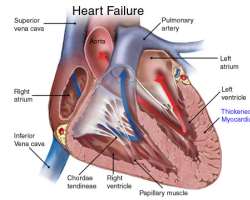Are You Doing These 5 Frequent Problems On Your Heart?

For men and women of any age, cardiovascular disease may be the primary killer. It kills more people than ALL kinds of cancer tumors combined. If you're black or over sixty-five, your risk of a heart attack is bigger, but it is an equal opportunity destroyer. Everyone, any where, any time may have a heart attack [1].
Myth #1: Solely older adults need to worry about their heart.
What can certainly lead to heart disease build up with time. To be a couch-potato, boredom eating and also not exercising are usually bad habits that may possibly begin in childhood years. Large numbers of clinical doctors are starting to have sufferers of strokes in their 20's and thirty's in place of victims primarily in their fifty's and sixty's.
Becoming physically fit and at the appropriate bodyweight would not make you proof against heart attacks. Although, both exercising regularly and maintaining the right bodyweight helps. In the end you must look at your blood cholesterol and blood pressure levels. A good cholesterol (or lipid profile) quantity is under two hundred. A very good blood pressure level is 120/80.
Myth #2: I'd feel unwell if I had high blood pressure levels or high cholesterol.
They name these, “silent killers” mainly because they indicate NO warning signs. One third of all older people have hypertension. Of those, one-third have no idea they've it.
High cholesterol levels is a way of measuring the fats stocked through your blood stream. Fats can be dropped anywhere in your system, but tend to congregate all around body organs. As well as your heart. This propensity might run in family members. So, even if you're at a good body weight and don't smoke cigarettes, have your blood cholesterol and blood pressure levels checked frequently. One time may not be adequate [2].
Myth #3: Women and men DON'T see the same symptoms.
Men and women CAN have those same warning signs, but they generally do not. Females have a propensity to get the subtler signs or symptoms though males usually have the kind of strokes you see in the movies. But, both gender CAN have any signs.
These subtler signs or symptoms, which include jaw achiness, nausea or vomiting, lack of breath and extreme fatigue, are likely to get defined away. “My jaw hurt mainly because my lunch time sandwich was on whole-grain bread and I was forced to chew very hard,” or , while clutching their stomach, “I probably should not have had that extra piece of pizza.” “Half of females have no chest pain after all,” states Kathy Magliato, a heart expert at California's St. John's Health Center. Put all the little warning signs to each other and listen to your own body.
Of course, both men and women might experience the “grab-your-chest-and-fall-down-gasping” kind of stroke, however you know, that's not the only way.
Myth #4: Assuming that my glucose level is in check, Being diabetic will not be a heart risk.
While trying to keep your sugar level with a regular range (80ml-120ml) helps keep you healthier and stronger, just having the excess glucose in your system takes its toll on arterial blood vessels. You will be exercising and eating more healthy to help control your diabetes, but don't forget to test your blood pressure and cholesterol levels, too.
Myth #5: My health practitioner would order exams if I were vulnerable to heart disease.
Generally, most of us ignore to tell the physician the little aches we feel. The physicians, with no knowledge of most of the things we think as insignificant, can pass over heart checks.
“Mammograms and Colonoscopies are routinely recommended by doctors,” says Merdod Ghafouri, a cardiologist at Inova Fairfax Medical center in Va, [3] “and are usually essential, but heart tests usually are not regularly conducted.” A heart scan can find plaque build-up within the arterial blood vessels before you even realize you've got problem.
Do you have the motor oil pressure and transmission liquid examined in your automobile? Have other preventive service done? Doesn't your only heart require as much care as your car or truck?
Links to Supplemental Sources About Heart Disease:
- [1] Family Doctor by American Academy of Family Physicians gives reliable health care info and tools for patients. They have a high-quality report covering high cholesterol cholesterol and arteries
- [2] Mediterranean Book is the National Board for the preservation of the Italian healthy eating traditions. It's a non-profits web site managed by Italians that enhance the Mediterranean Diet. They render news and health related research linked to the advantages of the Mediterranean sea diet regime and heart healthy healthy foods to avoid
- [3] Nutrition Certification is an academic website that presents free aid for medical doctors who will need to get a certificate in nutrition. Most health professionals need to pay attention to their patient's diet plan and tailor it to target their heart health. They produce a deep post on the best nutrition consultant consultant certification online supplied by the top United States universities specialised in heart related illnesses.
---------------------------------------------------
About the Author:
M. M. Bruce (@millie_bruce on Twitter.com) was born in Banffshire, Scotland on August 2, 1944. She had an undergraduate degree in Traditional medicine at the University of Glasgow in 1962. She have done nourishment therapy and she educated adult nutrition in Adult Day Care Centres. She labored for scientific editors and testers that produced publications for the New England Journal of Medicine. Now she's retired and from august 2005 to the present she has been a guest contributor for health-related websites and blogs
